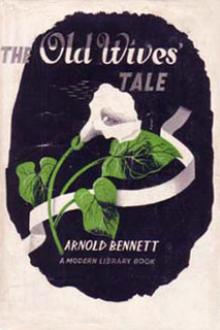Helen with the High Hand - Arnold Bennett (debian ebook reader .txt) 📗

- Author: Arnold Bennett
Book online «Helen with the High Hand - Arnold Bennett (debian ebook reader .txt) 📗». Author Arnold Bennett
And so he was to help her to wrest Andrew Dean from Lilian Swetnam! He was to take part in a shameful conspiracy! He was to assist in ruining an innocent child's happiness! And he was deliberately to foster the raw material of a scandal in which he himself would be involved! He, the strong, obstinate, self-centred old man who had never, till Helen's advent, done anything except to suit his own convenience!
The one bright spot was that Helen had no genuine designs on Emanuel Prockter. As a son-in-law, Andrew Dean would be unbearable; but Emanuel Prockter would have been--well, impossible. Andrew Dean (he mused) was at any rate a man whom you could talk to and look at without feeling sick.
When he had gazed at the affair from all points of view, and repeated to himself the same deep moral truths (such as "There's no doing nowt wi' a young woman afore she's forty") about thirty-nine times, and pitied himself from every quarter of the compass, he rose to go to bed; he did not expect to sleep. But the gas was not yet in order, and he had only one candle, which was nearly at its latter end. The ladies--Helen and Georgiana--had retired long since.
He left his little room, and was just setting forth on the adventure of discovering his bedchamber, when a bell rang in the bowels of the house. His flesh crept. It was as if--
The clock struck twelve, and shook the silent tower.
Then he collected his powers of memory and of induction, and recognised in the sound of the bell the sound of the front door bell. Some one must be at the front door. The singular and highly-disturbing phenomena of distant clanging, of thrills, and of flesh-creepings were all resolved into the simple fact that some one was at the front door.
He went back into his little room; instead of opening the front door like a man, he opened the window of the little room, and stuck out the tassel of his cap.
"Who's there?" he demanded.
"It's I, Mr. Ollerenshaw," said a voice, queenly and nervous.
"Not Mrs. Prockter?" he suggested.
"Yes."
"I reckon ye'd like to come in," he said.
She admitted the desire with a laugh which struck him as excessively free. He did not know whether to be glad or sorry that Helen had departed to bed. He did not even know whether to be glad or sorry that Mrs. Prockter had called. But he vividly remembered what Helen had said about caps.
Naturally, he had to let her in. He held the candle in his left hand, as he opened the door with his right, and the tassel of his cap was over his eye.
"You'll think I'm in the habit of calling on you at night," said Mrs. Prockter, as she slid through the narrow space which James allotted to her, and she laughed again. "Where is dear Helen?"
"She's gone to bed, missis," said James, holding high the candle and gazing at the generous vision in front of him. It wore a bonnet, and a rich Paisley shawl over its flowered silk.
"But it's only ten o'clock!" Mrs. Prockter protested.
"Yes. But her's gone to bed."
"Why," Mrs. Prockter exclaimed, changing the subject wilfully, "you are all straight here!" (For the carpets had been unrolled and laid.)
And she sat down on a massive Early Victorian mahogany chair about fifteen feet from the dying fire, and began to fan herself with her hands. She was one of your women who are never cold.
James, having nothing to say, said nothing, following his custom.
"I'm not ill-pleased," said Mrs. Prockter, "that Helen is out of the way. The fact is--it was you that I wanted to have a word with. You'll guess what about?"
"Mr. Emanuel?" James hazarded.
"Precisely. I had to put him to bed. He is certainly in for a very serious cold, and I trust--I fervently trust--it may not be bronchitis. That would mean nurses, and nothing upsets a house more than nurses. What happened, Mr. Ollerenshaw?"
James set the candle down on another Early Victorian chair, there being no occasional table at hand, and very slowly lowered himself to a sitting posture on a third.
"I'll tell you what happened, missis," he said, putting his hands on his knees.
And he told her, beginning with the loss of the ship and ocean, and ending with Helen's ever memorable words: "You must help me."
"That's what happened, missis," he said, grimly.
She had punctuated his recital by several exclamations, and when he had finished she gave rein to her sentiments.
"My _dear_ Mr. Ollerenshaw," she said, in the kindest manner conceivable, "how I sympathise with you! How I wish I could help you!"
Her sympathy was a genuine comfort to him. He did not, in that instant, care a fig for Helen's notion about the direction of caps. He was simply and humanly eased by the sweet tones of this ample and comely dame. Besides, the idea of a woman such as Mrs. Prockter marrying a man such as him was (he knew) preposterous. She belonged to a little world which called him "Jimmy," whereas he belonged to a little world of his own. True, he was wealthy; but she was not poor--and no amount of money (he thought) could make a bridge to join those two worlds. Nevertheless, here she was, talking to him alone at ten o'clock at night--and not for the first time, either! Obviously, then, there was no nonsense about _her_, whatever nonsensical world she belonged to.
She ran over with sympathy. Having no further fear of Helen making trouble in her own family, she had all her feelings at liberty to condone with James.
The candle, throwing a small hemisphere of feeble radiance in the vastness of the dim hall, sat on its chair between them.
"I _can_ help you," she said, suddenly, after grunts from James. "I'm calling on the Swetnams the day after to-morrow. I'll tell them about--about to-day, and when Mrs. Swetnam asks me for an explanation of it, I will be mysterious. If Lilian is there, Mrs. Swetnam will certainly get her out of the room. Then I will just give the faintest hint that the explanation is merely jealousy between Emanuel and Mr. Dean concerning--a certain young lady. I shall treat it all as a joke; you can rely on me. Immediately I am gone Lilian will hear about it. She will quarrel with Andrew the next time she sees him; and if he _wishes_ to be free, he may be."
She smiled the arch, naughty, pleasantly-malign smile of a terribly experienced dowager. And she seemed positively anxious that James should have Andrew Dean for a son-in-law.
James, in his simplicity, was delighted. It appeared to him a Mephistophelian ingenuity. He thought how clever women were, on their own ground, and what an advantage they had in their immense lack of scruple.
"Of course," said she, "I have always said that a marriage between Andrew Dean and Lilian would be a mistake--a very serious mistake. They are quite unsuited to each other. She isn't in love with him--she's only been flattered by his attentions into drawing him on. I feel sorry for the little thing."
At a stroke, she had converted a shameful conspiracy into an act of the highest virtue. And her smile changed, too--became a _good_ smile, a smile on which a man might depend. His heart went out to her, and he contemplated the smile in a pleased, beatific silence.
Just then the candle--a treacherous thing--flamed up and went out.
"Oh!" cried Mrs. Prockter.
And James had not a match. He never smoked. And without an atlas of the Hall, showing the location of match-boxes, he saw no hope of finding a match.
The fire was as good as gone. A few cinders burnt red under the ash, showing the form of the chimney-piece, but no more.
"An ye got a match?" he asked her.
"No," she said, drily, "I don't carry matches. But I can tell you I don't like being in the dark at all." Her voice came to him out of nothing, and had a most curious effect on his spine. "Where are you, Mr. Ollerenshaw?"
"I'm a-sitting here," he replied.
"Well," said she, "if _you_ can't find a match, I think you had better lead me to the door. I certainly can't find my way there myself. Where is your hand?"
Then a hand touched his shoulder and burnt him. "Is that you?" asked the voice.
"Ay!" he said.
And he took the hand, and the hand squeezed his hand--squeezed it violently. It may have been due to fear, it may have been due to mere inadvertence on the part of the hand; but the hand did, with unmistakable, charming violence, squeeze his hand.
And he rose.
"What's that light there?" questioned the voice, in a whisper.
"Where?" he whispered also.
"There--behind."
He turned. A luminance seemed to come from above, from the unseen heights of the magnificent double staircase. As his eyes grew accustomed to the conditions, he gradually made out the details of the staircase.
"You'd better go and see," the whispering voice commanded.
He dropped the hand and obeyed, creeping up the left wing of the staircase. As he faced about at the half-landing, he saw Helen, in an orange-tinted peignoir, and her hair all down her back, holding a candle. She beckoned to him. He ascended to her.
"Who's there?" she inquired, coldly.
"Mrs. Prockter," he murmured.
"And are you sitting together in the dark?" she inquired, coldly.
The story that the candle had expired seemed feeble in the extreme. And for him the word "cap" was written in letters of fire on the darkness below.
He made no attempt to answer her question.
CHAPTER XXIV
SEEING A LADY HOME
Those words of Helen's began a fresh chapter in the life of her great-stepuncle, James Ollerenshaw. They set up in him a feeling, or rather a whole range of feelings, which he had never before experienced. At tea, Helen had hinted at the direction of Mrs. Prockter's cap. That was nothing. He could not be held responsible for the direction of Mrs. Prockter's cap. He could laugh at that, even though he faintly blushed. But to be caught sitting in the dark with Mrs. Prockter, after ten o'clock at night, in his own house; to have the fact pointed out to him in such a peculiar, meaningful tone as Helen employed--here was something that connected him and Mrs. Prockter in a manner just a shade too serious for mere smiling. Here was something that had not before happened to him in his career as rent-collector and sage.
Not that he minded! No, he did not mind. Although he had no intention whatever of disputing the possession of Mrs. Prockter with her stepson, he did not object to all the implication in Helen's remarkable tone. On the contrary, he was rather pleased. Why should not he sit with a lady in the dark? Was he not as capable as any man of sitting with a lady in the dark? He was even willing that Helen should credit him, or pretend to credit him, with having prearranged the dark.
Ah! People might say what they chose! But what a dog he might have been had he cared to be a dog! Here he





Comments (0)